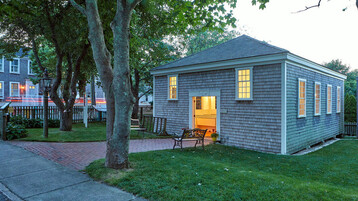"Nothing Will Be Covered Up" - African Meeting House Work Group Pushes For Transparency
JohnCarl McGrady •

Members of the African Meeting House Procurement Work Group pushed for transparency at a meeting on Monday, the culmination of several weeks of complaints from advocates unhappy with the progress of the independent review of the town’s response and investigation into the 2018 African Meeting House hate crime.
Recent disputes have centered on a lack of updates from the investigator and on a provision in the request for proposals issued by the Work Group that required the investigator to provide regular updates.
“This is the basis from which I certainly thought…we were going to be involved,” Work Group member Luke Thornewill said.
Town Counsel John Giorgio claims that the provision conflicted with the mandate issued by the Select Board to the Work Group, which empowered its members only to find and select an investigator. Giorgio said that the Select Board quietly vetoed the provision at a meeting on September 10th when Select Board member Brooke Mohr made a motion authorizing the Work Group to continue meeting only in response to direct questions from the investigator, which passed unanimously.
“The Select Board made a determination at an open public meeting to redefine the role that the Work Group would have during this investigation,” Giorgio said.
Some members of the Work Group were unhappy with that decision.
“Let’s just start over. Let’s just get rid of everything and start over,” Work Group member Clifford Williams said. “This is out of control, this is wrong.”
The investigator selected by the Work Group and hired by the town, Texas-based digital forensics firm LCG Discovery Experts, submitted a series of questions, but the Work Group never reviewed them. Instead, Giorgio provided answers. Most of the questions were logistical in nature, though one asked whether monthly reports would be required. Giorgio replied that LCG could determine when to file reports on an as-needed basis. A month has since passed with no update. The full list of questions and answers is available here.
Giorgio also raised the possibility that LCG’s final report might initially be presented only to the Select Board in executive session if its contents risk infringing on the privacy rights of implicated individuals.
“We have to be careful that the rights of all the parties involved in this matter are protected, the civil rights that everyone has,” Giorgio said. “There are privacy rights that have to be protected.”
Several Work Group members requested that, even if some redaction was legally required, the report be released to the public to the greatest extent permitted by law.
“It is my hope that the Select Board, after review, regardless of what the decisions and the conclusions are, will make this report as public as legally possible,” African Meeting House president and Work Group member Noelle Trent said. “I would just like to publicly urge the Select Board to, regardless of what conclusions come out in the next year through this investigation, to make the report as public as legally possible.”
“If the Select Board decides to pull this in executive session, all the people who are asking me every week are going to say the same old thing: that it was covered up,” Work Group member Rocky Fox said. “There is no way but, I hope, for this to become public.”
Work Group chair Malcolm MacNab, who also sits on the Select Board, agreed.
“I will assure you that nothing will be covered up. The report, if it’s legally possible, will be public. Period. If somehow that’s stymied in some way, then I will raise hell,” MacNab said. “The reality of life [is] that this report will be public, and made public in an appropriate and legal way. There’s just no way it can’t.”
The Work Group is the result of a citizen petition sponsored by island resident Gail Holdgate that was approved at the May 2024 Annual Town Meeting. The non-binding petition - Article 36 - asked the Select Board to authorize and fund a new independent investigation, as well as a review of the original investigation into the hate crime. While the Select Board declined to pursue a new investigation of the hate crime, it decided last August to authorize funding for an independent review of the original investigation and send out an RFP for firms to conduct that review. After its initial RFP and the process that created it were criticized, the Select Board decided to create the African Meeting House Investigation Procurement Work Group to hash out the details and select an entity to conduct the review with various stakeholders at the table.
But the new Work Group has also not been free of controversy. Even before the transparency concerns raised at Monday’s meeting, members had pushed back against an error in the original RFP that excluded an investigation of town administration. The town claimed the omission was inadvertent, and it was corrected with an addendum.
The town’s initial handling of the hate crime drew intense backlash from the community, the ripples of which are still reverberating today. No one was ever criminally convicted for the graffiti, which included a racial slur and a phallus, but Dylan Ponce was found responsible for the hate crime in a civil rights case in 2022.